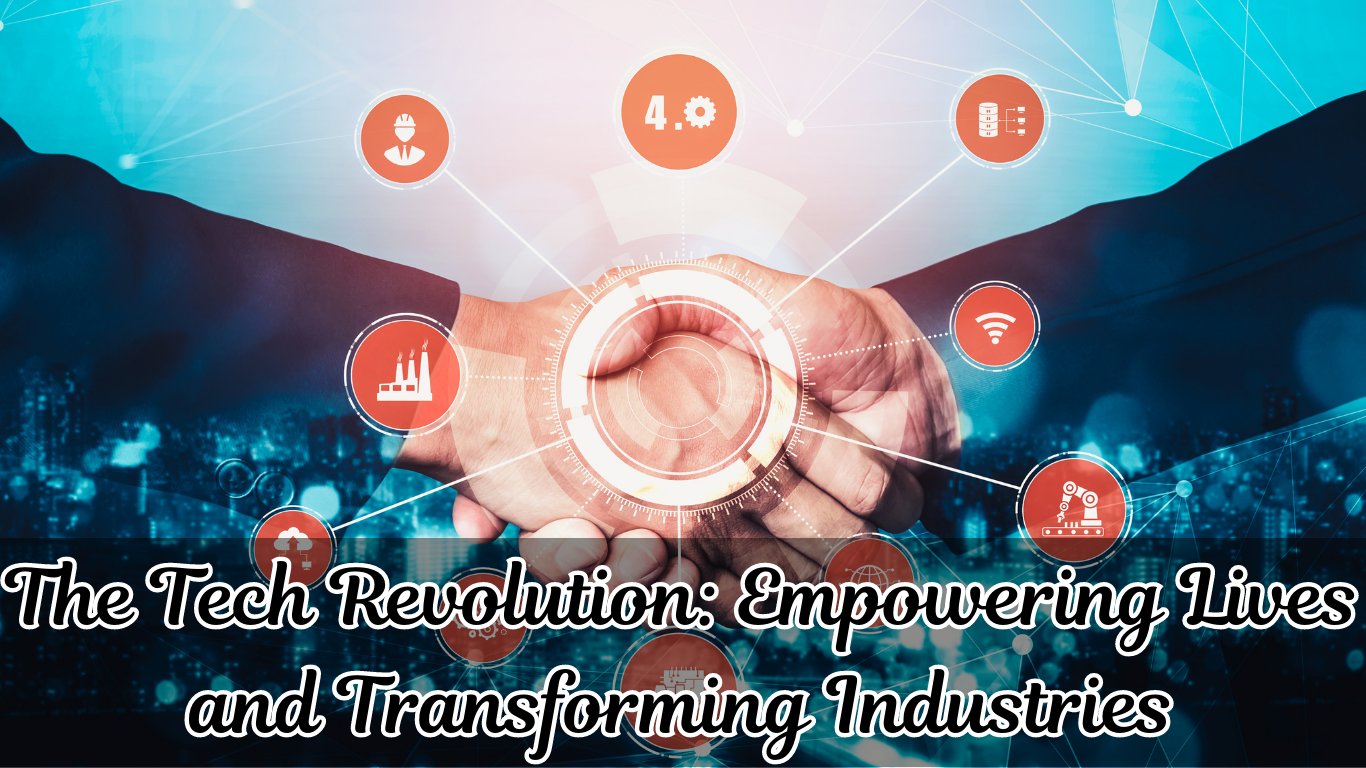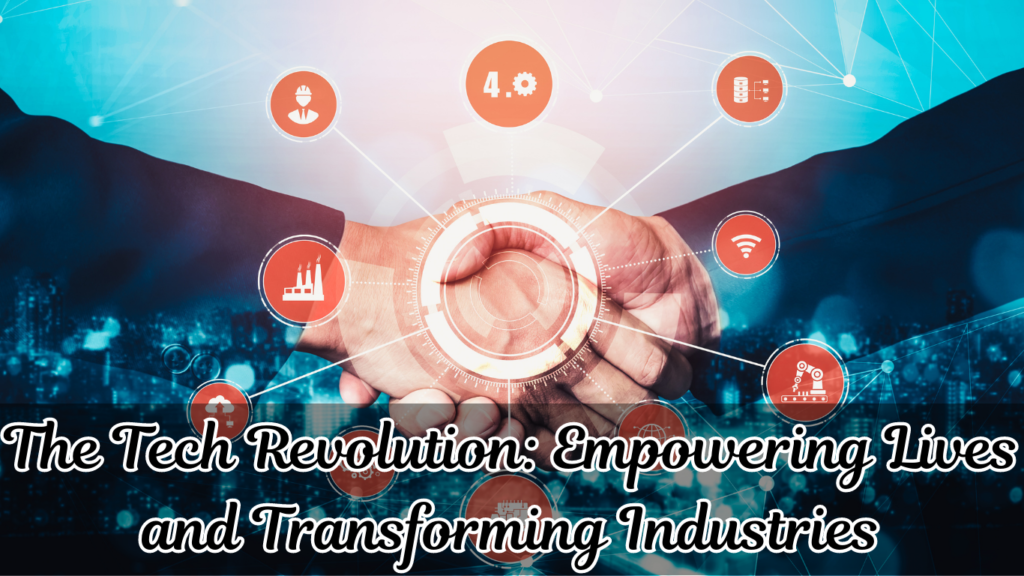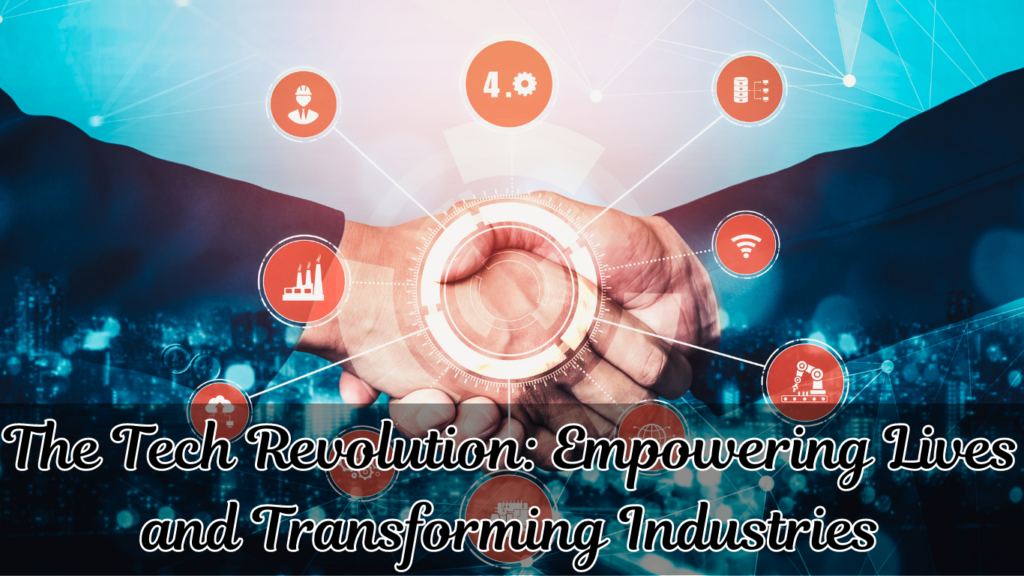The Tech Revolution: Empowering Lives and Transforming Industries:

Today’s world is characterized by ongoing technological breakthroughs that have an impact on how we live, work, and interact. We have had a spectacular technological revolution over the last few decades that has significantly changed many facets of our life. The Tech Revolution has empowered humans and revolutionized businesses in ways that were previously imagined, from the way we communicate to the way we do business. We will examine how technology has fueled advancement, creativity, and empowerment in this blog as we delve into the far-reaching implications of this revolution.
The Industrial Revolution: Paving the Way for Technological Advancements:
The development of steam engines, the mechanization of manufacturing, and the construction of railway networks set the groundwork for later technical advances.
The Tech Revolution’s Societal Impact: Bridging Gaps and Fostering Inclusion:
Wearable health technologies enable people to monitor their health metrics, enabling proactive healthcare management.
Financial technology (fintech) solutions have made banking and financial services more accessible in the world of finance. People who were previously unable to access financial services now have access to them thanks to peer-to-peer lending platforms, digital wallets, and mobile banking.
Industry 4.0: The Tech Revolution in Manufacturing:
The technological revolution has also ushered in Industry 4.0, an era in which digital technologies are integrated into manufacturing procedures. Smart sensors, automation, and Internet of Things (IoT) devices have transformed factories by increasing production efficiency and lowering operating costs. These systems generate real-time data that allows for predictive maintenance, which reduces downtime and increases efficiency.
Customization and personalization of products are now feasible on a large scale thanks to Industry 4.0. Businesses can create items specifically for each customer, increasing their pleasure and loyalty.
The Fourth Industrial Revolution and the Future of Work:
The need for abilities like creativity, critical thinking, emotional intelligence, and problem-solving is growing as automation and AI replace conventional tasks. People must embrace lifelong learning and adaptability in order to remain relevant and successful in a rapidly changing labor market.
Technology and Environmental Sustainability:
Global awareness of the significance of environmental sustainability has grown in the aftermath of rapid industrialization and technological breakthroughs. The technological revolution has also significantly influenced innovation and approaches to a greener future.
Smart Cities: As a solution to the problems caused by urbanization and resource consumption, the idea of smart cities has evolved. Smart cities seek to improve resource allocation, transport infrastructure, and waste generation by combining data-driven technology and IoT devices. Cities could become more habitable and environmentally sustainable thanks to these measures.
Circular Economy: The development of the circular economy, in which goods and resources are made to be reused, renovated, or recycled, has been made possible by the technological revolution. Companies can trace the lifecycle of items and efficiently recover and recycle materials by utilizing technology. By minimizing waste and easing the burden on natural resources, this strategy helps to ensure a more sustainable future.
Tech Revolution in Entertainment and Media:
Streaming Services: The traditional television paradigm has been impacted by platforms like Netflix, Amazon Prime, and Disney+, which offer on-demand access to a sizable library of films, TV programmed, and original content. In addition to giving viewers more control over their viewing experience, the move to streaming has enabled indie filmmakers and content producers new ways to reach a worldwide audience.
Virtual Reality and Gaming: Gaming and entertainment now have immersive experiences thanks to virtual reality (VR) technology. The gaming business has undergone a change, with gamers now having access to more realistic and engaging experiences thanks to VR headsets and interactive simulations. Virtual reality also has uses outside of games, such as architectural simulations, virtual training courses, and virtual travel experiences.
Social Media and Content Creation: The development of social media platforms has decentralized content production, enabling people to share their tales, show off their skills, and create communities around common interests. Influencers and content producers may now monetize their online presence and attract millions of followers, ushering in a new era of digital enterprise.
Ethical Considerations and Tech Governance:
Although the tech revolution presents many potential, it also poses ethical problems and demands prompt attention. Among the most urgent challenges that require attention are data privacy, cybersecurity, and AI ethics.
Data Privacy: Huge volumes of data are being gathered and used, which raises questions regarding data security and personal privacy. In order to protect user information, tech businesses must be open and honest about their data practices.
Cybersecurity: As our reliance on digital technologies grows, so does the possibility of cyberattacks. To create strict cybersecurity protocols and guard against potential breaches, governments, companies, and individuals must collaborate.
AI Morals: As AI is used more frequently, concerns regarding its ethics and responsibility surface. To prevent sustaining current socioeconomic inequities, it is essential to ensure that AI algorithms are fair, unbiased, and transparent.
Tech governance: Regulatory frameworks frequently lag behind the quick rate of technology progress. Establishing comprehensive tech governance laws that balance innovation and regulation requires cooperation between governments and international organizations.
Conclusion: Embracing the Tech Revolution for a Brighter Future:
A significant force that has changed industries, empowered people, and shaped the world we live in today is the technological revolution. Technology has significantly improved society, from the emergence of AI and Industry 4.0 to the democratization of education and the push for environmental sustainability.
All stakeholders must cooperate in order to realize the full potential of the tech revolution. Governments must create innovative environments while preserving the rights of their constituents. Businesses should adopt ethical behavior, put environmental sustainability first, and spend money on employee training.
For themselves to remain relevant in a changing job market, people can embrace lifelong learning and adaptation. Additionally, individuals can help ethical tech firms that place a high priority on data protection and AI ethics by acting as customers. We can guide the tech revolution towards a better future by cooperating and sharing a common vision, one in which technology continues to empower people, revolutionize businesses, and build a more inclusive and sustainable world for future generations. Let’s acknowledge the successes of the tech revolution and build on them to create a more affluent and just future. The journey has only just begun, and there are numerous possibilities. Let’s welcome this change and guide it towards a better, fairer future.
Average Rating
Welcome to our news website, where you’ll find the latest updates on global events, politics, technology, entertainment, and more. Stay informed with our reliable and comprehensive news coverage, featuring in-depth articles, breaking news, and insightful analysis. From local stories to international headlines, we strive to keep you connected and engaged with the world around you. Explore our diverse range of news categories and stay ahead of the curve with our timely and accurate reporting.





















5 Security Risks of Shared Web Hosting Services Explained

Technology and its Impact on Society

Adani Power's 1,600 MW Godda thermal power plant becomes fully operational

Jignesh Shah: The Man Who Believes in ‘Never Say Die’

Vinod Adani explained what benefits motivational speakers can bring to a company?

Understanding Section 53 of the Insolvency and Bankruptcy Code (IBC)

Understanding Section 50 of the CGST Act, 2017



